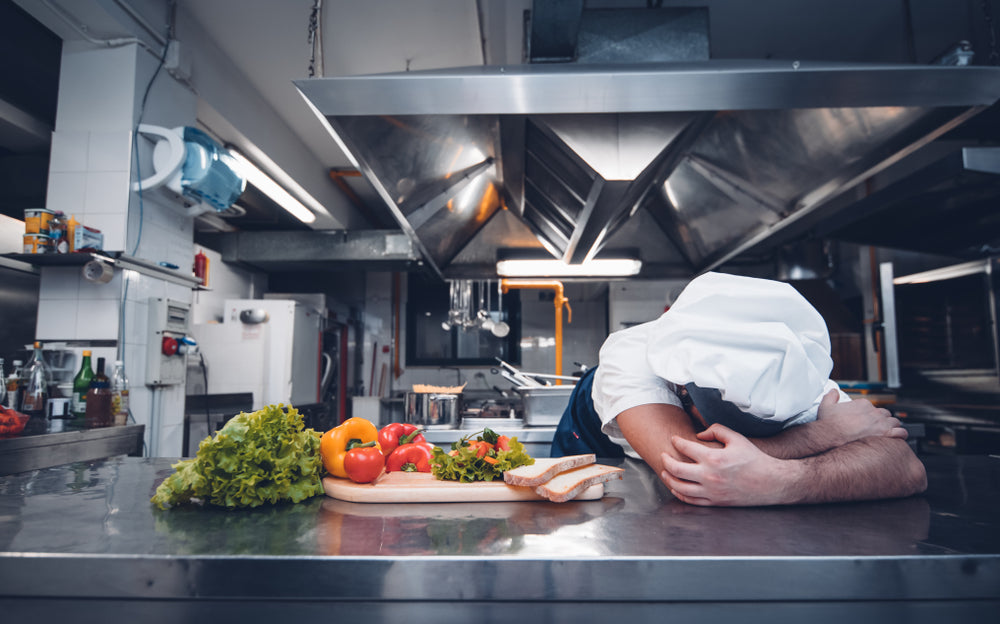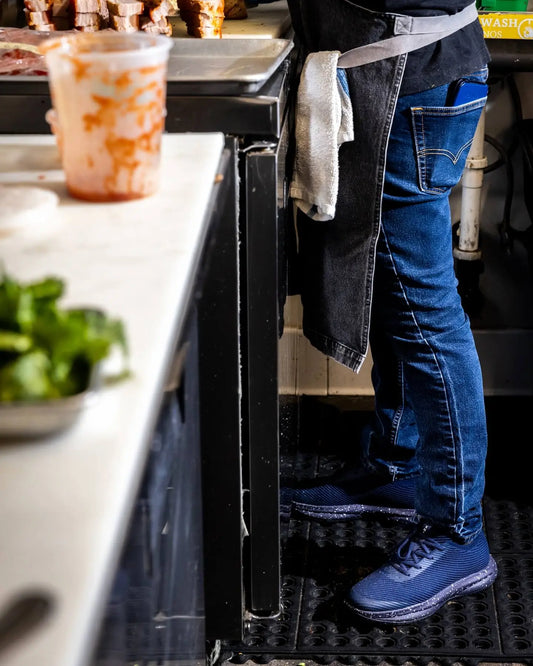Understanding Chef Burnout: Strategies for Well-Being
Snibbs Footwear
Being a professional chef is often romanticized as a glamorous and fulfilling career. We imagine culinary maestros whipping up delectable dishes with a smile on their faces. Yet, behind the scenes, the reality can be quite different. However, like any other profession, there are pros and cons of being a chef.
The culinary industry is notorious for its intense demands, which can lead to chef burnout. There are many challenges and pressures faced by chefs. But to better understand these challenges and pressures, it's important to uncover the underlying causes and symptoms associated with burnout in the culinary profession.
Challenges Faced by Chefs
Working in a professional kitchen is like stepping into a pressure cooker. Chefs and their kitchen staff must cope with long hours, high expectations, tight deadlines, and the need to deliver exceptional culinary creations consistently. This can create a perfect storm for burnout. Let's examine some of the specific challenges of being a chef:
- Demanding Work Environment: Kitchens are fast-paced, high-stress environments. Chefs must navigate the heat of the professional kitchen, manage multiple tasks simultaneously, and handle the pressure of producing top-quality dishes on time.
- Long and Irregular Hours: The culinary world operates on its own clock, often requiring chefs to work long, irregular hours, including nights, weekends, and holidays. This can disrupt their personal lives and lead to a lack of work-life balance.
- Physical and Mental Strain: The physically demanding nature of the job, coupled with the mental strain of multitasking and meeting expectations, takes a toll on chefs' well-being. They are constantly on their feet, enduring heat, noise, and high-pressure situations.
Recognizing the Symptoms of Chef Burnout
Chef burnout doesn't happen overnight, but it's gradual and builds up over time. By recognizing the warning signs, chefs and kitchen staff can proactively address burnout before it becomes debilitating. Here are some common symptoms to watch out for:
- Physical Exhaustion: Feeling constantly fatigued, experiencing muscle aches, and battling frequent headaches are telltale signs of burnout. The demanding physical nature of the job, coupled with excessive work hours, takes a toll on chefs' bodies.
- Emotional Exhaustion: Burnout can drain chefs emotionally. They may feel detached, cynical, or emotionally numb, losing the passion and enthusiasm they once had for their craft. The joy of cooking can even become overshadowed by a sense of dread.
- Decreased Job Satisfaction: Chefs experiencing burnout may find themselves losing interest in their work. Tasks that were once enjoyable become burdensome, and the creative spark may fade away, leading to a decline in overall job satisfaction.
- Impaired Performance: Burnout can compromise a professional chef's ability to perform at their best. They may make more mistakes, experience a decline in the quality of their work, and struggle to meet their own or others' expectations.
Strategies for Combatting Burnout
The culinary world can be challenging, but there are ways for chefs to combat burnout and prioritize their well-being. Some strategies that help promote work-life balance and prevent burnout in the culinary profession include:
- Prioritize Self-Care: Chefs can often put their own well-being on the back burner. However, self-care is crucial for combating burnout. Engage in activities that rejuvenate you outside the kitchen, such as exercise, hobbies, spending time with loved ones, or simply relaxing.
- Establish Boundaries: Learn to set boundaries and communicate your limits effectively. Negotiate realistic work hours, shifts, and time off to ensure a healthy work-life balance.
- Practice Stress Management: Find stress management techniques that work for you. This could be deep breathing exercises, mindfulness meditation, or engaging in activities that help you unwind and reduce stress.
- Delegate and Collaborate: Embrace teamwork and delegate tasks when possible. Collaborating with your team can lighten the load and foster a supportive work environment. Effective delegation allows you to focus on essential tasks and reduces the risk of burnout.
- Seek Support: Reach out for support when needed. Discussing your feelings and challenges with trusted colleagues, mentors, or loved ones can provide a fresh perspective and emotional support.
Overcoming Chef Burnout with Snibbs
Chef burnout is a pressing issue, but it can be overcome. By understanding the challenges, recognizing the symptoms, and implementing practical strategies, chefs can navigate the demanding nature of their profession while maintaining their passion and joy for cooking.
Taking care of yourself is not a luxury; it's essential for long-term wellness and success in the culinary world. When it comes to comfort and support, Snibbs has your back. We understand the immense pressure chefs face in the culinary industry and are committed to helping you prioritize your well-being. That’s why our durable non-slip kitchen shoes provide comfort and support to help you excel in the professional kitchen environment.
Sources:
- Forbes. Restaurant Employee Burnout: What It Is And How To Manage It. https://www.forbes.com/advisor/business/restaurant-employee-burnout/












